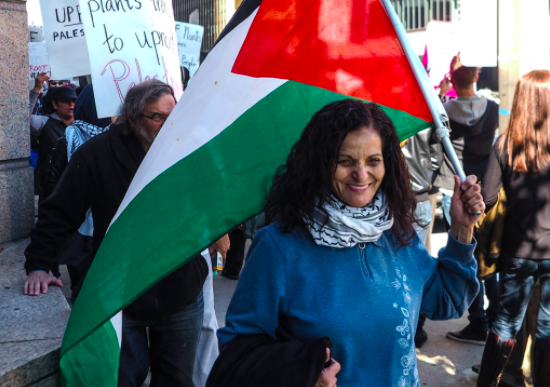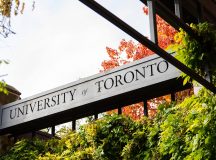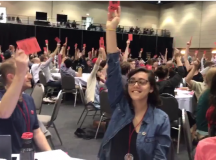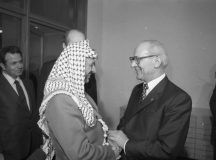Cary Nelson reviews Steven Lubet’s The Trials of Rasmea Odeh: How a Palestinian Guerilla Gained and Lost U.S. Citizenship. Few things capture the degraded political culture of the Western anti-Zionist left more than its canonisation of the unrepentant Palestinian terrorist and serial liar Rasmea Odeh. Odeh was ‘enthusiastically embraced across the entire spectrum of the American left’ and ‘no amount of evidence would convince them’ of her crimes’ concludes Lubet. Believing what you want to believe is a defining condition of anti-Zionist politics then and now.
An hour before noon on 21 February 1969, shoppers patronising Supersol, Jerusalem’s largest supermarket, were, as Steven Lubet reminds us in The Trials of Rasmea Odeh, ‘making their last-minute purchases for Sabbath meals’ (25).[1] Suddenly a powerful explosion erupted from ‘a shelf across from the meat counter, ripping through the ceiling. Debris flew like shrapnel, as cans, bottles, shards of glass, and decorations for the Purim holiday tore through the store.’ Two Hebrew University agriculture students, roommates Edward Joffe and Leon Kanner were nearby and killed. Nine others, among them a Holocaust survivor and a UN attaché, were wounded. As first responders were sorting the dead and wounded, a police officer noticed a can suspiciously out-of-place; it contained a second bomb, timed to go off shortly. It was safely defused.
The operation was planned and carried out by members of the Palestinian Front for the Liberation of Palestine (PFLP). In the 2004 Palestinian documentary Women in Struggle, Rasmea Odeh and Aisha Odeh (no relation) sat side-by-side, with Aisha admitting she had placed the bomb, whereas Rasmea scouted locations and chose the target. Working with an explosives expert, the two of them had assembled the bomb at Rasmea’s house. In a 1990 interview Rasmea Odeh described herself as a member of the PFLP Central Committee (7). The PFLP was for some years the most violent organisation behind Palestinian terrorism, carrying out several airplane hijackings and other acts of violence.
Israeli security was likely aware of Odeh’s involvement with the PFLP before the bombing. In any case, investigators broke into her family’s home in al-Bireh at midnight of 28 February, a week after the Supersol murders. They found and seized a cache of hand grenades, detonating cords, pencil-fuses, demolition bricks, and sticks of gelignite, along with 11 February shopping receipts from Supersol, perhaps obtained while scouting the target. Experienced agents would not keep explosives and other evidence at home, but the PFLP at the time regularly recruited and used amateurs.
In a video filmed by Legal Insurrection founder William Jacobson just days before her death in 2009, Edward Joffe’s mother Roslyn says her goodbyes to her family while reporting that her son’s death overshadowed the rest of her life. For the family, it was always as if the killings took place yesterday. Decades in which the bombing’s key organiser Rasmea Odeh was lauded by the anti-Zionist left made fully coming to peace with Joffe’s death impossible for the family. In an Associate Press column, Joffe’s niece ‘expressed the ‘sheer agony’ of seeing her celebrated as a ‘pillar of her community’’ (116).
Lubet’s meticulously researched and documented book gives us the first full account of Odeh’s life we have had. It required a great deal of original research. The results make for compelling reading and constitute an important addition to the historical record and to our understanding of contemporary politics. Notably, however, the book does not do much to help us understand the national trauma for Israelis that the Supersol bombings and other murders caused. The book does, on the other hand, give an unexpectedly sympathetic portrait of Odeh herself, despite the fact that a major impulse behind writing it was to gather for the first time all the evidence proving beyond any doubt that she is guilty of murder in the deaths of Joffe and Kanner. Much of the evidence that she also repeatedly lied about her involvement in the murder has been detailed by others, among them Jacobson. But other evidence — notably Arabic language interviews by Odeh and her accomplices that freely admit their roles in the crimes, interviews either unnoticed in the west or recorded later — are made accessible here in English for the first time. As Lubet writes, ‘Odeh has freely admitted her participation in the supermarket bombing — although only when speaking Arabic’ (8). Lubet wants to settle the debate about Rasmea Odeh’s guilt once and for all, and he succeeds, but most likely only for those for whom facts matter. These are debates in which hardened views prevail. For those of her supporters only interested a portrait of a heroic victim, a more complex life story may only be an inconvenience.
The trials referenced in Lubet’s title are not limited to those that took place in Israeli or US courts. They began for Rasmea in exile, in the flight of her family from the Jerusalem area village of Lifta during the first weeks of the 1947-48 Nakba, notably before the killings at Deir Yassin provoked widespread panic. The agricultural village of Lifta in Lubet’s account is a pastoral place of origin; her exile stands in for an exile from Eden. ‘Former residents of Lifta recalled their lost home as a paradise’ (14). But Rasmea was only an infant when the family fled to Ramalla. The family’s trials then escalated as they struggled to find employment and housing on the West Bank. Lubet quotes Rasmea’s claim that she ‘remembers little of her childhood “except for the suffering”’ (15).
Nonviolent resistance to the occupation that began a generation later merits support on both moral and political grounds, but implicit in Lubet’s narrative is an unstated conclusion that Palestinian suffering not only leads to but also lends legitimacy to resistance through terrorist violence. If we place Odeh’s story in a larger international context, something Israel’s opponents are loath to do, we readily realize there is no lack of appalling poverty and discrimination throughout the Western Hemisphere, not only in Palestine and throughout Africa and Asia. Mass poverty and political disenfranchisement anywhere — often class, ethnicity, or religiously based — could justify indiscriminate violence if we want to go down that route. I wish that Lubet had drawn more definitive moral distinctions among the available forms of Palestinian resistance. That would lead to a deeper inquiry into why most Palestinians, unlike Odeh, have not chosen lethal violence and what motivates the far smaller number, including Odeh, to go down the path of violence. The potential for internationally organised nonviolent resistance to propel change has never been fully tested either in Israel itself or in the occupied territories.
It would only be years later, during her time in the US, that Odeh participated in nonviolent political organising. There is no evidence that she ever seriously considered the option before then. But she has never repudiated her terrorist years. In the US she found herself in a different political environment and adapted to it with great success. In 2005 — having falsified her political and criminal history to US immigration authorities in Amman, Jordan, to enable her to achieve permanent resident status in the US in 1995 — she began working at the Arab American Action Network (AAAN) on Chicago’s southwest side. She became a full-time employee and later the organisation’s associate director, focusing especially on empowering Arab women immigrants. Among her notable achievements was sponsoring writing workshops; they were supported by a grant from the University of Illinois Institute for Public Policy and Civic Engagement. The Chicago Cultural Alliance recognised her as an outstanding community leader with a 2013 award. That does not, however, make her a reformed terrorist. She remained proud of the Supersol bombing, the killing of civilians, and her participation in a subsequent bombing at the British Consulate the day after Supersol. The consulate bombing only damaged an office that was unoccupied at that moment. She admitted to participation in both bombings in a 1980 interview with Soraya Antonius published in the Journal of Palestine Studies. She characterised terrorist activity as her ‘military work.’ Had she not been arrested, she would no doubt have continued her violent PFLP activities.
Both structurally and conceptually, the two detailed portraits of Rasmea Odeh — terrorist and community organiser — bookend Lubet’s effort to define her character. Among the mediating events are the lies she told in Jordan and again in 2004 when applying for naturalised US citizenship and the lies she told at her 2014 trial on charges she obtained US citizenship by falsifying her history. Among the numerous 2004 lies are her negative answers to a series of questions on her immigration application, among them:
Have you EVER been charged with committing any crime or offense?
Have you EVER been convicted of any crime or offense?
Have you EVER been in jail or prison? (92)
In Israel, Odeh was tried and convicted of murder, sentenced to two life terms, and served ten years in an Israeli prison. Although she would later say she couldn’t understand English when she answered similar questions negatively in 1995, in fact she had already had extensive English language instruction and taken graduate courses taught in English in Beirut. Her lawyers would attempt unsuccessfully to introduce a novel defense to explain the 2004 lies—that PTSD had led her to repress her memories. As Lubet astutely points out in his compelling analysis of her answers at trial and the evidence introduced, her own statements and those of her lawyer reveal that her memories remained intact. Lubet calls it ‘a contrived theory of suppressed memory that had virtually been invented for her benefit’ (3).
Nonetheless, he declares her a sympathetic figure. That is partly because the terrorist half of her biography includes her being tortured by Israeli authorities and partly because her work in Chicago symbolically redeems her, at least for some. Israel’s use of torture for suspected terrorists in the midst of ongoing terror campaigns has by now been documented and established. The US of course engaged in torture in the years after 9/11 as well, though that does not make the practice any less abhorrent. Yet we can expect countries to continue resorting to torture when their citizens are murdered by organised political groups, despite evidence that information obtained by torture is often unreliable.
Unlike Lubet, I do not find her ‘beyond question a sympathetic figure’ (115). Her story is complex, and her journey is in many ways extraordinary. But her work in Chicago does not turn it into a story about redemption. When she joined George Habash’s Arab Nationalist Movement, the predecessor to Habash’s PFLP, at that point still quite young, she was embarked on an antisemitic quest. Habash would offer terrorism’s guiding principle in a 1970 interview: ‘to kill a Jew far from the battleground has more of an effect than killing 100 of them in battle’ (23). She had already learned to understand the Jewish state in distinctly antisemitic terms. When she found her mother repeatedly in tears, she asked for an explanation: ‘I cry because the Jews came from every corner of the earth and took everything we had and now we have nothing to live on’ (15). Released from prison in a prisoner exchange, she had an updated version of the same accusation: ‘For European and American audiences, Rasmea Odeh has presented herself as the innocent victim of an Israeli frame-up, in which a false confession was extracted by torture’ (8). She claimed that the confession was in Hebrew, a language she did not know, and thus that she signed it without knowing what it said. In fact, she wrote and signed the confession in Arabic (40). Its major elements have since been confirmed by other sources. Moreover, as Lubet explains, it included details only Odeh herself could have known. That makes a politicised refusal to accept her guilt still more striking, a lesson with far wider application than the case at hand.
An important contribution of Lubet’s book is to present a case study in how a murderer and liar becomes a political hero of the anti-Zionist and antisemitic left. It is one reason the book deserves to be widely read. Lubet does not offer an extended analysis of the process of canonisation, but his book will surely encourage people to think about the matter. One of the sad, unseemly but indicative features of Odeh’s elevation to an idealised figure embodying a political cause is the increasing overstatement, fictional embellishment, and falsification of her actual history of torture. Odeh herself contributed to that process, and her allies picked up the ball and ran with it. If torture is to be more universally regarded as a crime against humanity, scrupulous accounts of its use are essential. Otherwise, claims of torture are reduced to propaganda and cannot themselves serve as forms of moral witness.
In Israel she was subjected to physical abuse for seven days after her arrest. She admitted her guilt and wrote her confession the following day. Such a confession would not be admitted in a US court, but, as Lubet points out, that does not alter its accuracy. Given the other evidence we have, including her own later admissions, the fact of torture is no basis for doubting what she did. Lubet opts to call her substantial additions to the story of her torture ‘exaggerations’. To say that the interrogators broke her jaw, when they did not, is not an exaggeration; it’s a malicious invention of an event that never happened (117). Although at first she testified that the torture ended after seven days, she later expanded it to 25 days. Some of her allies preferred to claim it lasted for 45 days. In her later accounts, the torture included monstrous sexual humiliations that also never took place. Threats of sexual assault did apparently occur; that was a sufficient basis for condemnation, without padding the account with lies.
These fictionalised versions of her torture may have made the fact that she gave the Israelis dozens of names of other PFLP agents seem less damning to her fellow terrorists. The fake stories certainly helped her gain unqualified victim status among her US supporters. ‘Odeh’s cause had been enthusiastically embraced across the entire spectrum of the American left’ (2-3). ‘No amount of evidence would convince them that she had committed the underlying offense in Israel or that she had intentionally concealed her background on her visa and citizenship applications’ (3). It was the equivalent of jury nullification in the public sphere. ‘Some statements of support for Odeh omitted all mention of the Supersol bombing, asserting instead that her Israeli conviction had been only for seemingly nonviolent offenses’ (116). Odeh supporters at all familiar with her history would have to have understood that to be a thoroughly dishonorable suppression of the truth. And yet they tolerated the deception. Some no doubt participated in it. Odeh’s personal lies had become collective ones.
Fundraisers that supplied her advocates with social reinforcement took place in multiple cities. Students for Justice in Palestine organised campus rallies. The AAAN apparently decided that PFLP was merely an advocacy group, that Israel had convicted her for ‘her alleged association with a leftist Palestinian nationalist group’ (108). Jewish Voice for Peace issued a statement that declared her innocent and used her US trial to launch a campaign against Israel. JVP’s Brant Rosen was particularly expansive in praising her and proclaiming her innocence. ‘She was neither a terrorist nor a perjurer in his eyes but rather a victim — tortured by Israel and persecuted in the US — who deserved sympathy and admiration’ (2). Marc Lamont Hill called her a ‘‘Palestinian freedom fighter being railroaded for her commitment to justice’’ (178-9). Angela Davis wrote a piece for the Detroit News as the 2014 trial opened. ‘In Davis’s view, the only reason for prosecuting Odeh had been “retaliation for the growing successes of the Palestine solidarity movement”’ (141). The defense argued that the Israeli court records should have been excluded because they were comparable to ‘documents created by a Nazi court operating in occupied France that convicted partisans resisting occupation’ (180), which shows how a familiar slander can be adapted to give it more contextual force. Not that the Nazis required any legal proceedings before executing partisans.
Before her trial began, Odeh was offered a plea deal that would have enabled her to admit her guilt and leave the country without going to prison. She refused because she wanted a theatrical event that would put the Jewish state on trial. She was, is, and will be a fierce opponent of Israel and an antisemite. Combatants for Peace by contrast is ‘a non-profit, volunteer organisation of ex-combatant Israelis and Palestinians, men and women, who have laid down their weapons and rejected all means of violence.’ Some members of Combatants for Peace became peacemakers after spending time in an Israeli prison. That is not who Rasmea Odeh is. Convicted at trial in the US, she appealed, claiming that the judge’s decision to exclude the fantasy theory of involuntary suppressed memory denied her right of self-defense. However weak the theory was, the appeals court agreed and granted a new trial. As part of his superb analysis of the first US trial, Lubet argues that the prosecution would have been better off allowing the defense to introduce the theory and then demolishing it. Now the government countered by introducing a superseding indictment, adding a charge that she had lied about her membership in a terrorist organisation. Her sainthood would now be on trial. And this time a conviction could mean prison. She accepted the same plea deal she had been offered before and departed for Jordan.
Unlike Lubet, I would have preferred that she spend a few months in prison. Otherwise, there’s little reason for people not to lie as part of a visa or citizenship application. He argues that ‘Odeh’s admirable decades-long life in the United States surely should have counted in her favor in the eyes of the Department of Justice’ (201). In my view that argument supports a shorter sentence, but not immediate release. Being deported alone is neither a sufficient deterrent to dishonest testimony nor a sufficient safeguard for national security when terrorists are involved.
Lubet muses about an alternative reality: ‘There is no telling how much more Rasmea Odeh could have achieved in Chicago if the U.S. Department of Justice had not intervened’ (101). I am not inclined to any comparable feelings of regret. Nor, moreover, am I willing to assume that her ‘selfless’ advocacy in Chicago included no anti-Zionism or antisemitism. At trial her lead attorney Michael Deutsch advanced a similar argument: ‘She is an extraordinary woman of great compassion and dignity. And it would pain me, and I think any people who hope for justice, to make her into a criminal after all the work that she’s done in her community and [for] her people’ (168). Indeed, ‘Deutsch was hoping that the court would validate the Supersol bombing as a legitimate act of resistance’ (127). At least in court, history nullification did not win the day. It had already won on the anti-Zionist left.
Of course a strong impulse behind her unqualified embrace by a mass movement was the widespread disposition among Israel’s opponents simply to believe what they wanted to believe, a defining condition of anti-Zionist politics then and now. Her celebrity status was sustained by willing self-deception. While political naivety played a role for some, her supporters included others considered politically sophisticated by themselves and others. But when delusions gain group support and reinforcement, doubt may be suppressed and critical faculties can give way to movement passion. It is possible to support a political movement without abandoning the capacity to evaluate its arguments and resist its misguided impulses. But organised anti-Zionism seems unable to do so. The movement canonisation of Odeh is a striking and indicative example of that failure. But, unlike her life story, it is not unique. That is one reason why it is so important to have Steven Lubet’s unforgettable account of this case.
References
[1] Steven Lubet, The Trials of Rasmea Odeh: How a Palestinian Guerilla Gained and Lost U.S. Citizenship, George Mason University Press, 2021.




































